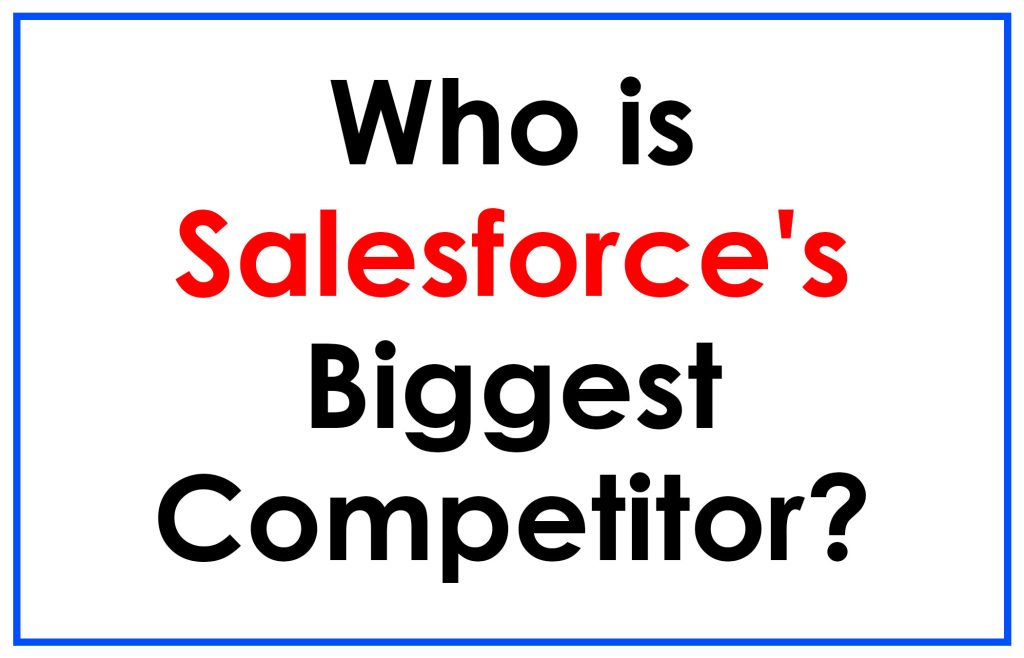Salesforce Biggest Competitor
In the rapidly evolving landscape of customer relationship management (CRM) software, determining Salesforce Biggest Competitor is crucial for businesses seeking to optimize their CRM strategy. While Salesforce is a dominant player, boasting extensive features and widespread adoption, it faces significant competition from other CRM solutions. Knowing Salesforce Biggest Competitor helps organizations make informed decisions about which platform best suits their needs.

Introduction to the CRM Market
The CRM market is vast, with numerous players vying for the top spot. To rival Salesforce’s dominance, its biggest competitor has to offer robust features, excellent customer support, and seamless integration capabilities. Among these competitors, HubSpot, Microsoft Dynamics 365, and Oracle CRM are frequently cited as the most formidable challengers.
HubSpot: A Comprehensive Challenger
Microsoft Dynamics 365: The Enterprise Choice
Oracle CRM: The Comprehensive Suite
Key Features that Define Salesforce Biggest Competitor
To be considered Salesforce Biggest Competitor, a CRM solution must offer several key features that rival Salesforce’s offerings. These features include:
1. Robust Integration Capabilities
Integration with other business applications is crucial. Salesforce Competitor must offer seamless integration with a variety of tools and platforms, ensuring that data flows effortlessly across the organization.
2. Advanced Analytics and Reporting
Advanced analytics and reporting capabilities are essential for any top CRM solution. Consequently, businesses need actionable insights to make informed decisions. Therefore, Salesforce’s biggest competitor should provide robust analytics tools that can process large volumes of data and deliver meaningful insights.
3. User-Friendly Interface
A user-friendly interface is a significant factor in determining Salesforce’s biggest competitor. A CRM system that is easy to navigate and use ensures higher adoption rates and better user satisfaction. Furthermore, intuitive design reduces the learning curve for new users, making the transition smoother. Consequently, businesses can maximize productivity and achieve better outcomes with minimal training.
4. Customization and Scalability
Customization options and scalability are vital. Therefore, Salesforce’s biggest competitor should offer extensive customization features to tailor the CRM to specific business needs and be scalable to grow with the business. Additionally, flexible configuration options allow businesses to adapt the system as their requirements evolve. Consequently, this adaptability ensures long-term viability and supports continuous growth.
5. Comprehensive Customer Support
Reliable customer support is a key differentiator. Therefore, Salesforce’s biggest competitor must provide excellent support to help businesses resolve issues quickly and effectively. Additionally, comprehensive training resources and a strong user community can enhance the overall customer experience. Moreover, prompt and efficient support can significantly reduce downtime and improve user satisfaction.
Comparing Competitors: HubSpot, Microsoft Dynamics 365, and Oracle CRM
HubSpot vs. Salesforce
HubSpot’s ease of use and affordability make it an attractive option for small to medium-sized businesses. Additionally, its marketing automation tools and customer service capabilities are top-notch. However, Salesforce offers more extensive customization options and a broader range of features. Therefore, it is more suitable for larger enterprises.
Microsoft Dynamics 365 vs. Salesforce
Microsoft Dynamics 365 excels in its integration with other Microsoft products and its advanced analytics capabilities, making it a robust choice for large enterprises that rely heavily on Microsoft ecosystems. Conversely, Salesforce offers more industry-specific solutions and a more extensive third-party app marketplace.
Oracle CRM vs. Salesforce
Oracle CRM’s strength lies in its comprehensive suite of applications and advanced data analytics, making it a great fit for large organizations requiring extensive customization. Meanwhile, Salesforce’s vast ecosystem and superior user interface give it an edge in terms of user experience and versatility.
Conclusion:
Identifying Salesforce Biggest Competitor is essential for businesses seeking the best solution for their needs. While HubSpot, Microsoft Dynamics 365, and Oracle CRM all offer robust features and capabilities, the choice ultimately depends on specific business requirements and preferences. By understanding the strengths and weaknesses of each competitor, organizations can make informed decisions that enhance their CRM strategies and drive business growth.
Summary:
Salesforce Biggest Competitor involves comparing key features, integration capabilities, and user experiences of top CRM solutions like HubSpot, Microsoft Dynamics 365, and Oracle CRM. Each competitor offers unique advantages, making the choice dependent on specific business needs. Understanding these competitors helps businesses make informed CRM decisions, driving growth and efficiency.
Author Spotlight

Chandan K. Sharma
An entrepreneur and author with a deep passion for technology, CRM, and digital marketing. Chandan is a versatile content creator and expert in CRM, sales automation, and marketing automation. He combines creativity with strategic thinking to deliver innovative, scalable solutions that help businesses streamline operations and drive growth.